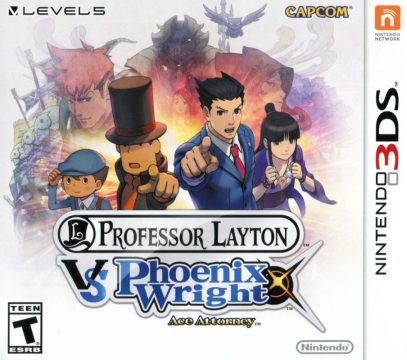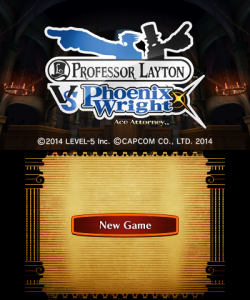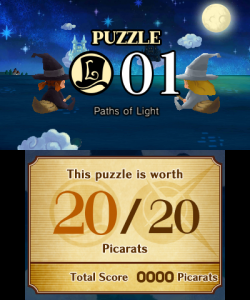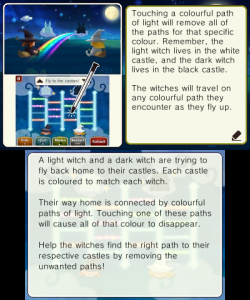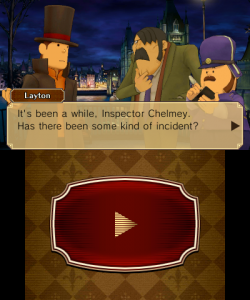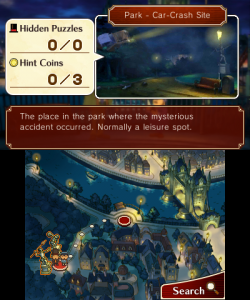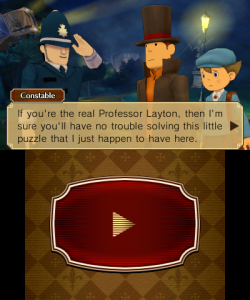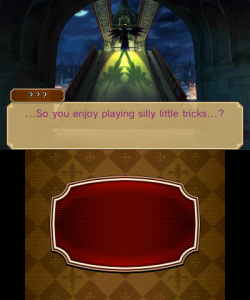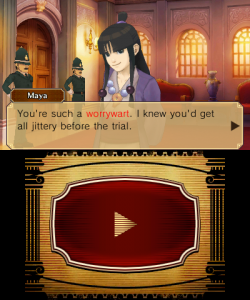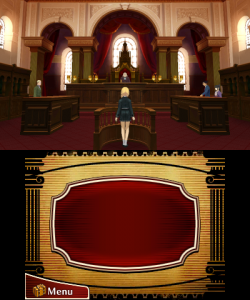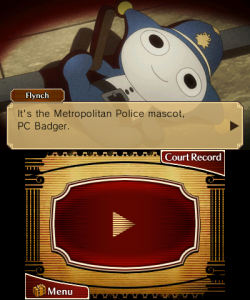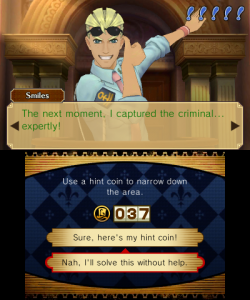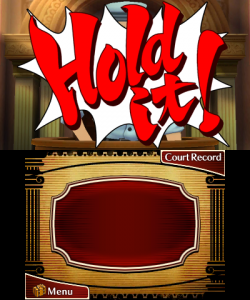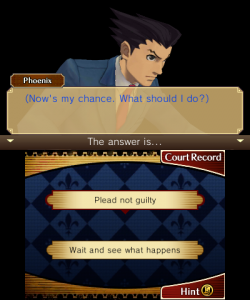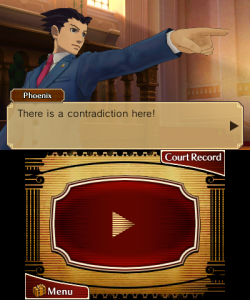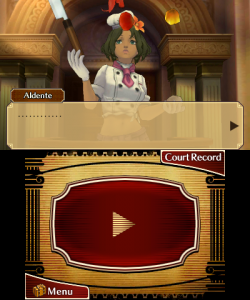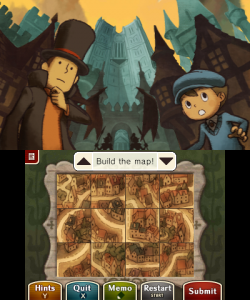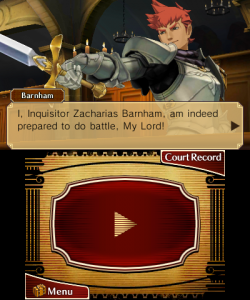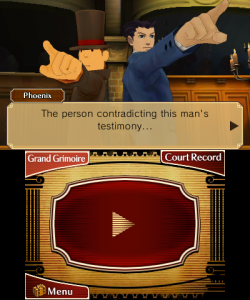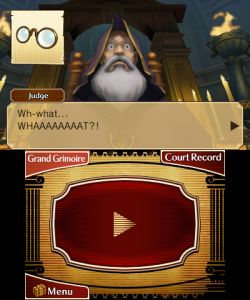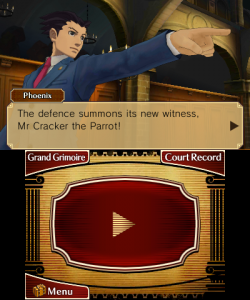- Professor Layton and the Curious Village
- Professor Layton and the Diabolical Box
- Professor Layton and the Unwound Future
- Professor Layton and the Last Specter
- Professor Layton and the Miracle Mask
- Professor Layton vs. Phoenix Wright: Ace Attorney
When Level-5’s Akihiro Hino created the character of Professor Layton, he took inspiration from Capcom’s Phoenix Wright, studying the characters and what he perceived were its flaws. The two franchises were competitors; but when Hino pitched Capcom and Ace Attorney‘s writer Shu Takumi the idea of a crossover, after some convincing, both companies decided to work together on the project, making Professor Layton vs. Phoenix Wright much more than a cash-in. In fact, it is arguably overlooked as a great game, although don’t expect anything revolutionary.
Both franchises are ostensibly narrative games with an emphasis on puzzles (and main characters who point fingers), so a crossover makes sense for their likely-overlapping fanbases. And the game doesn’t shy away from some of the hotly anticipated moments, like when both Layton and Wright point the finger and shout “Objection!” simultaneously. However the “versus” the title implies is milquetoast at best; their opposition, when it eventually happens, amounts to a pillow fight between two characters who are always shown keen to cooperate to find out the truth, and have a great deal of respect for each other. Their differences in approaches, skills, and temperaments (Layton always cool, collected, respected, and patient; Wright warm, fiery, clumsy, and the underdog) are never explored or used for drama or antagonization in the game. That being said, Layton is often shown superior to Wright, mentoring him, guiding him, having it figured out before him, or jumping in to make the crucial argument instead of Wright. This somewhat cuts the wind out of Wright’s sails, and might not be a very convincing introduction to the character if you’ve never encountered him before, although it is true the Phoenix Wright dynamic (always an underdog, underestimated, snatching victory from the jaws of defeat at a moment where all seems lost) is difficult to mesh with Layton’s, the invincible Sherlock Holmes.
And this is even despite Shu Takumi writing the game; but overall, this is a Layton game more than a Wright game. The story (ostensibly set up as an independent episode in each of their original trilogy – Wright a respected lawyer, no Emily Altava with Luke and Layton) is a classic Layton story, with supernatural phenomena (here, witches) scaring a medieval town in the fantastical world of Labyrinthia, for which a young lady, Espella Cantabella, repeatedly gets in trouble and blamed for, and needs to be defended in court. After a prologue, Phoenix and Layton both find each other in the world of Labyrinthia, and team up. Luke talks to animals, Chemley makes a cameo in the prologue, you have to look for a cat at some point, and you need to explore a looming tower in the finale – the classic Layton playbook. There’s maybe a bit more darkness with the witch trials (complete with burning the guilty parties, which shocks our protagonists – in a way that doesn’t feel very consistent with the fact that the Ace Attorney series also features death sentences), and the female characters are overall fairly weak and helpless (including Maya, frustratingly). Ultimately, in classic Layton fare, the finale relies on piling absurdly convoluted and unpredictable plot twists on top of each other hoping to awe the player (although things are a little bit more predictable, or less original, than in previous episodes), and all is well for our characters. (None of the characters or their relationships are furthered, which is to be expected for a crossover episode.)
Apart from a PC Badger reference, there aren’t really any crossovers with the Phoenix Wright universe; Maya’s medium powers go completely unused, for instance, and one gets the impression the Phoenix-Maya relationship was written to be made more similar to Layton-Luke’s, when there is quite a bit more depth (and trauma) to it than “smart guy and his spunky sidekick”. The amount of supernatural is also veering more on the Layton side; however this also conversely creates a very interesting (and novel) situation in Phoenix’s first trial in Labyrinthia, where every witness is blatantly twisting facts to get a conviction because the whole town believes witches’ powers are limitless, and Phoenix is left explaining what are contradictions and logic.
The game is structured around a dozen chapters, consisting of four Layton-like chapters and four trials, with a grand finale, epilogues and prologues; with around two-to-three hours per chapter, the game clocks in at about 24 hours of gameplay. This is a nice way to break it up, although some of the trials end up being a bit lengthy. The game runs in the same engine introduced in Professor Layton and the Miracle Mask, with its 3D-based exploration phases, map-based movement, hint coins, anime sequences, etc. (This also means Phoenix and Maya are in 3D, and dubbed, for the first time ever, and quite nicely with that.) That being said, the Layton portion is slimmed down compared to its usual: there are no minigames to unlock, and only about 70 puzzles. That being said, the 70 puzzles are actually mostly inventive, unique, and overall of very good quality, as if we got the top half of a typical Layton game, one might say. The only minor change to typical Layton are in the multiple-choice sequences (introduced in the second trilogy), which are sometimes reframed clumsily with “Objection!”-based conversations; it ends up not really working out.
The Ace Attorney gameplay, however, introduces a few major changes. Apart from the presence of some multiple-choice sequences, which are too trivial and do not introduce any meaningful branching/strategizing, two other novelties are very inspired. First is the ability to use Layton hint coins during trials to narrow down the area to object to or rule out some possibilities; this nicely addresses what has historically been the fiddliest part of Ace Attorney games (when you know there is a contradiction but need to find the right trigger that the game has in mind), and has legs to it. That being said, Ace Attorney veterans will find this episode’s difficulty to be overall lower than other Ace Attorney games, and the typical Layton bonanza of hint coins only make the game easier, clearly for the benefit of players new to Ace Attorney.
Another major change from the second trial on is the introduction of multi-witness testimonies, where several people talk and can be pressed/cross-examined, but more importantly, what they say/explain can trigger interesting reactions from other people. This adds some welcome dynamism, with the original testimony potentially changing as a result of Phoenix noticing someone else has something to say, and discoveries and clarifications are introduced without necessarily an objection backed with hard evidence; it’s a very nice narrative device that blends very well with the typical Ace Attorney gameplay, and Shu Takumi ended up reusing it in his next game, The Great Ace Attorney Chronicles. Other than that, the witnesses are goofy (and honestly sometimes on the annoying side), lots of “Objection!”, and Inquisitor Barnham serves as a satisfying Miles Edgeworth-lite opponent that fights Phoenix but ultimately is on the side of the truth.
Finally, on the presentation side, the usual medieval-inspired Layton direction fits the story and theme very well, and the game is still very nice to look at, in particular with some of the puzzles utilizing 3D very nicely and maybe more frequently than in previous episodes. The 3D models are very nice, including Phoenix and Maya’s transition to 3D, while Layton and Luke’s animation feels less rigid and puppet-like than in Professor Layton and the Miracle Mask. However, it should be noted that there are regrettable framerate issues in some of the busiest sequences in the second half of the game. The sound design is very good, especially with the typical Ace Attorney sounds appearing within the usual Layton dialogue, which spices things up. But the soundtrack is really the standout here, and in particular the rousing orchestral renditions of all the classic Ace Attorney themes, which fit with the medieval theme but also add a great bit of flair (see “Objection! 2012”, for instance); the Layton side of the soundtrack is very nice but ultimately pretty standard fare, focusing on accordions and xylophones once again, although some arrangements of existing themes also benefit from the orchestral treatment (like the Professor’s theme).
The game was somewhat overlooked but overall should be widely appreciated. Ace Attorney fans unfamiliar with Layton might be flummoxed by the quantity of puzzles, but the meaty trials and great gameplay additions should make up for that; Layton fans might be underwhelmed by the presentation of Phoenix and Maya, but the streamlined trial gameplay should be satisfyingly. If you are somewhere in the middle, it could end up being a very nice balance, given the Layton puzzles are less numerous and of better average quality, and the trials are less fiddly. But all in all, this is no cash-in cross-over; a lot of work, care, and thought clearly went into this episode, and it ends up being, maybe a bit unexpectedly, a very strong game.

